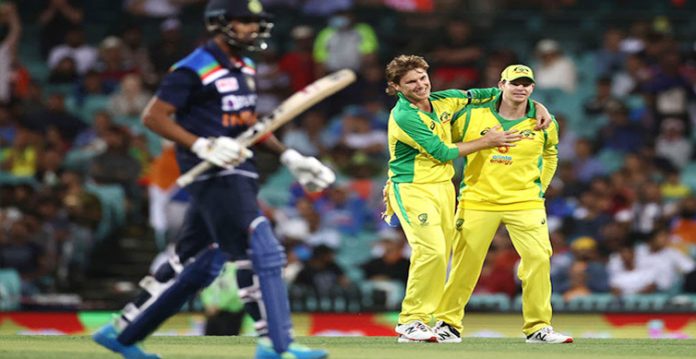Sydney: On Friday, Australia beat India by sixty-six runs in the first One-day International at the Sydney Cricket Ground to take a 1-0 lead in the three-game series.
In spite of the fact that there was a rearguard action from Hardik Pandya, who got his highest ODI score (90 off 76 balls) and added 128 runs for the fifth wicket with opener Shikhar Dhawan (74 off 86), Australia’s total of 374 for six wickets in 50 overs, their highest against India in one-dayers, turned out to be too daunting for India. India completed at 308 for eight wickets in 50 overs.
India lost their initial three wickets inside the initial 10 overs to lose momentum. Both Agarwal and other opener Shikhar Dhawan had given India a supercharged beginning of a 53-run opening stand a little more than five overs. But, at that point Hazlewood struck with three short-pitched deliveries to dent India’s march, picking Mayank Agarwal, Shreyas Iyer, and Virat Kohli.
Prior, captain Aaron Finch and Steve Smith scored centuries to direct Aussie charge, after Australia won the toss.
Finch scored 114 from 124 balls with the assistance of nine 4s and two 6s while Smith scored 105 off only 66 deliveries – with eleven 4s and four 6s – as the hosts took a hefty toll for hapless Indian bowlers who had no alternative to count on.
Leg-spinner Yuzvendra Chahal was the most badly hit, going for 89 in his 10-over spell. He could take only one wicket. Chahal’s are the most number of runs conceded by an Indian spinner on ODIs, going even worse than 85 that another leg-spinner, Piyush Chawla, conceded in his 10 overs against Pakistan in 2008.
Choosing to bat, the hosts began consistently with both Finch and David Warner taking as much time as necessary to adjust to the pitch. Nonetheless, when they got settled, there was no looking back as the pair shared a 156-run opening wicket partnership in 27.5 overs.
Over the span of the partnership, Finch became the second-quickest Australian to score 5,000 ODI runs (126 innings, 11 more than Warner).
India got their initial breakthrough as Warner lost his wicket against Mohammed Shami after playing a well-balanced 69-run knock, with the assistance of six 4s.
Smith, who was next in line, began right from the get-go and scored runs fast, adding 108 runs with Finch.
Finch, the Australia captain, was dismissed by Jasprit Bumrah after he got to his seventeenth ODI hundred.
Glenn Maxwell, who had failed badly in the IPL, came great and crushed the Indian bowlers. Maxwell utilized switch-hit and reverse sweep to great impact as he made 45 runs off only 18 balls (five 4s, three 6s) prior to getting caught at the long-on boundary off the bowling of Shami.
With Marnus Labuschagne getting dismissed before long, ex-Australia chief captain Smith guaranteed that he kept his team on course for a high total. He adhered to one end, continued scoring boundaries freely and raised his tenth hundred in only 62 balls – the third quickest by an Australian in ODIs. The ex-Australia captain was bowled in the last over of the innings, yet not prior to delivering huge damage to the Indian team.
Among India bowlers, just Mohammed Shami could go for below six runs an over.
In response, India got off to an awful beginning losing three wickets, Agarwal, Kohli, and Iyer, in the initial 10 overs. They at that point lost KL Rahul in the fourteenth over. However, Pandya and Dhawan kept the expectations alive. Pandya scored rapidly and was especially severe on the spinners.
However, the pressure caught up to them. Dhawan tumbled to a dismissal, giving a catch off Adam Zampa to short mid-off and a couple of overs later Pandya also tumbled to Zampa, holing out to long-on. At the hour of Pandya’s dismissal, India still required 128 out of 11 overs and they had no batsman, besides Jadeja (25 off 37) to take them. In the end, they missed the mark by 67 runs.
with IANSinputs


